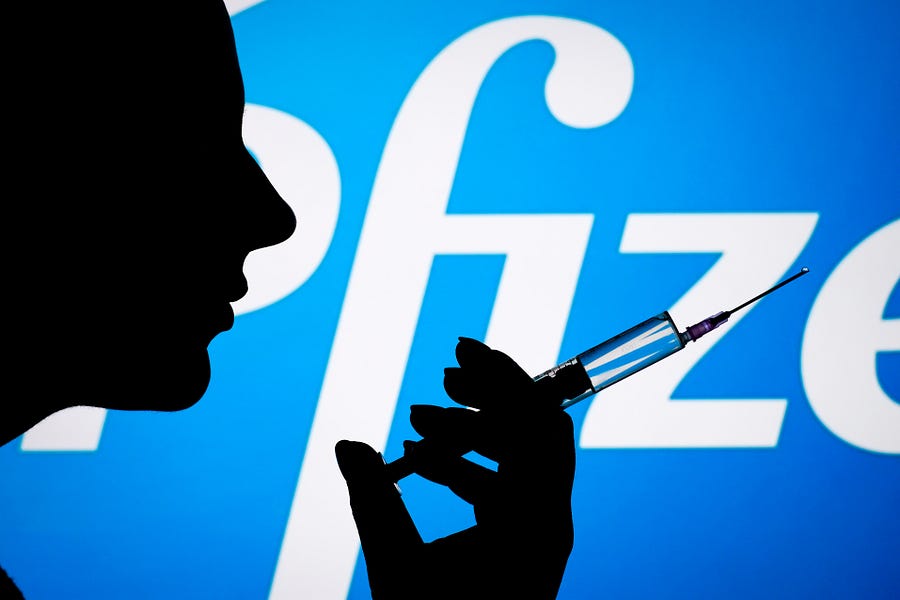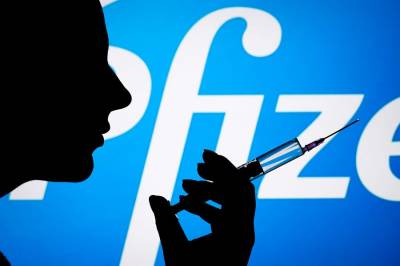Widely shared social media posts claim that the Pfizer vaccine causes viral shedding that leads to a disruption of menstrual cycles and possible miscarriages. One viral Instagram video, in particular, includes the following caption: “Pfizer document confirms ‘Covid Vaccine Shedding’ leading to ‘Menstrual Cycle Disruption’ and ‘Miscarriage’ is possible via ‘skin-to-skin contact’ and ‘breathing the same air’.”
The video claims that “the vaccinated seem to be shedding something terrible to the unvaccinated.” The video also says that Pfizer “was concerned about shedding” in its vaccine trials, “by inhalation or skin contact.”
These are false claims. The Pfizer vaccine does not cause viral shedding and does not lead to “menstrual disruption” and “miscarriages.”
First, for some context on vaccine shedding. In an email to The Dispatch Fact Check Vincent Racaniello, professor of microbiology and immunology at Columbia University, explained vaccine shedding as “any of the material that is injected into you and then 'comes out' of the needle wound,” he said. “This is bound to be minimal because the injection is deep into the muscle and then a band-aid is usually put on top. With some vaccines, like oral polio vaccines, one ingests the vaccine and then it is shed in the stool.”
Racaniello noted, though, that vaccine shedding does not occur with a messenger RNA (mRNA) vaccine like Pfizer’s, because there is no virus in the vaccine. “With the mRNA vaccines there is no virus in the vaccine and therefore no shedding of virus from any site,”he said.
Representatives from both Pfizer and the Centers For Disease Control and Prevention further confirmed this point in statements to The Dispatch Fact Check.
A spokesperson for Pfizer said: “The Pfizer-BioNTech COVID-19 vaccine is a synthetic mRNA vaccine and does not contain any virus particles. Because there is no virus produced in the body, no shedding occurs within the human body. The vaccine cannot be inhaled via shedding and can only enter the human body through an administered dose.”
A spokesperson for the Centers For Disease Control and Prevention confirmed that claim. “There is no way for a COVID-19 vaccinated person to ‘shed vaccine.’ COVID-19 vaccines give instructions to teach our cells how to make a protein—or even just a piece of a protein—that triggers an immune response inside our bodies. After the protein piece is made, the cell breaks down the instructions and gets rid of them. The immune response, which produces antibodies, is what protects us from getting infected if the real virus enters our bodies. COVID-19 vaccines do not use the live virus that causes COVID-19 and cannot cause COVID-19. Therefore, people who receive a COVID-19 vaccine cannot shed the virus or the vaccine.”
An earlier fact check noted that there is no evidence that the COVID-19 vaccine causes miscarriages. As far as the claim that the vaccine interferes with menstrual cycles, Paula Hillard, Medical Director of Pediatric and Adolescent Gynecology at Stanford Children’s Health, said in an interview with The Dispatch Fact Check that “there is no evidence that the vaccine will affect the menstrual cycle.” Hillard said that even though one could argue that we don’t yet have the studies to look at menstrual cycles and the vaccine, it is still “biologically implausible” that the vaccine would cause menstrual disruption or miscarriages.
Hillard mentioned that she does not discount women who have reported having menstrual disruption after the vaccine, but that “it’s not a level of scientific evidence that can allow us to conclude that something might happen.” Hillard further said there is no “biologic plausibility that the vaccine would impact risk of miscarriage.”
A spokesperson from Pfizer also said: “Based on current knowledge, experts believe that COVID-19 vaccines are unlikely to pose a risk to the pregnant person or fetus.”
If you have a claim you would like to see us fact check, please send us an email at factcheck@thedispatch.com. If you would like to suggest a correction to this piece or any other Dispatch article, please email corrections@thedispatch.com.







Please note that we at The Dispatch hold ourselves, our work, and our commenters to a higher standard than other places on the internet. We welcome comments that foster genuine debate or discussion—including comments critical of us or our work—but responses that include ad hominem attacks on fellow Dispatch members or are intended to stoke fear and anger may be moderated.
With your membership, you only have the ability to comment on The Morning Dispatch articles. Consider upgrading to join the conversation everywhere.